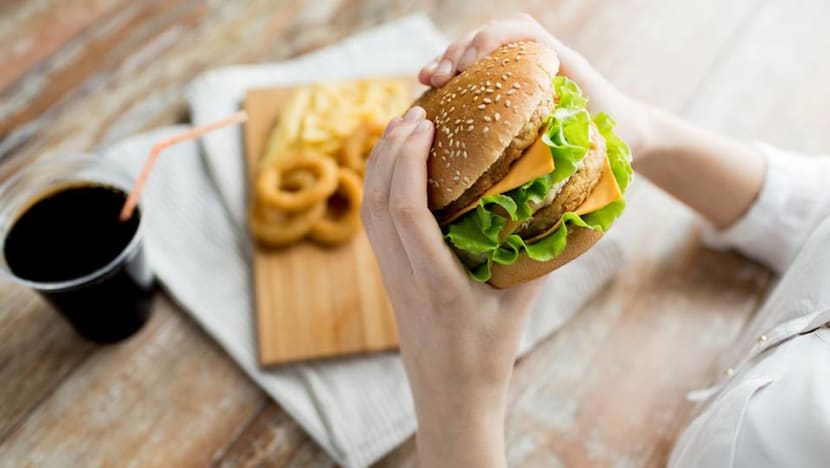commentary Commentary
Commentary: Why do some children choose unhealthy food when they get older?
From birth to preschool, most children’s meals are carefully curated. The struggle begins once they step into a school canteen but getting them to make healthy choices can be easy, says Saw Swee Hock School of Public Health’s Mary Chong.

Children during meal time at an MOE kindergarten in Punggol View. (File photo: MCI)
SINGAPORE: We breathe a sigh of relief seeing our children enter primary school. Gone are the days of dealing with fussy eating and agonising over what they eat.
Just as we think our children’s eating habits are stabilising and that we have it all under control, they transit through another stage of life – a stage where they have a growing appetite for independence and want to make personal decisions on their food and activities.
Convincing our children to listen and adhere to advice on eating healthily, being more physically active and having less screen time becomes incredibly challenging.
What’s more, with them spending a large proportion of time out-of-home, we find ourselves struggling to be fully aware of their activities and have less control of what they choose to consume or do.
Two years ago, my team and I conducted focus group discussions with 55 primary school children, aged nine to 12. We gleaned some invaluable insights into how they think and act when it comes to food.

In general, all the children we interviewed demonstrated a good understanding of healthy eating and were able to share why it is important.
The tricky thing was that having this knowledge did not necessarily translate into consistent healthy eating behaviours. While a few children tried to adhere to a healthy diet, many felt that the consequences of unhealthy food wasn’t really a big concern.
Instead, food and taste preferences appeared to be the key factors determining food choices.
READ: Commentary: When is your child’s fussy eating a serious medical problem?
READ: 1 in 3 young children undernourished or overweight: UNICEF
Existing research bears that out - children’s food intake intentions and behaviours tend to be influenced by habitual responses and emotional factors such as whether the food is pleasant, enjoyable or disgusting, and less by cognitive persuasion.
This is likely because children have yet to develop the cognitive abilities to understand concepts like nutrition, health and care much less about how it will affect them in the future.
PARENTS ARE CRITICAL ROLE MODELS
One thing that came up quite clearly is how much children look up to parents as role models.
Some recounted that their parents would talk to them about healthy eating and reinforced their advice by providing healthy meals at home (such as using healthier cooking methods and preparing vegetables and fruits) and ensuring well-balanced meals when eating out.
Others mentioned that their parents would reprimand or scare them, to get them to eat certain healthy foods. Some of the children also expressed displeasure at their parents’ constant nagging at them to consume fruits and vegetables, yet didn’t eat these themselves.

Several described that their parents would forbid the storage of “junk foods” at home. But these less healthy foods would be provided as rewards when children engaged in physical activities or consumed vegetables.
In response to the strict restrictions, a few children said they did all this appease their parents, while some chose to consume the restricted foods in secrecy.
Practices like these often do not teach children how to self-regulate their food consumption. Instead, they undermine a child’s perceived importance of adherence to healthy eating and lead to increased preference of the less healthy reward foods.
OUTSIDE INFLUENCES: TEACHERS AND SOCIAL MEDIA
Having heard what children said in our focus groups, I appreciate even more the health education lessons, the Healthy School Meals programme in schools, and the important role teachers play in reinforcing healthy behaviors - things we often taken for granted.
The children were aware that fruits and vegetables were mandatory for all meals sold in schools, although some alluded to only eating the fruits and vegetables prepared in ways they preferred, for example vegetables stir-fried with garlic and seasoning instead of simply boiled, fruits cut and bagged up rather than placed on the same plate beside the main meal.
READ: Commentary: How to sabotage your child’s future – five dangerous notions about life, careers and education
Besides learning about healthy eating as part of the school curriculum, some children spoke of how their teachers would monitor their intakes during recess time and snack time.
This showed the importance of ensuring consistency of healthy eating messages across home and school, as conflicting ones may confuse children and hinder their ability to make prudent dietary choices.
Then there is the potent impact of social media and advertising. The children we interviewed revealed that while they were aware of health promotion posters in and around their schools, the advertisements on online platforms were the ones that often captured their attention.
For example, one student cited the video advertisement from the Let’s Beat Diabetes campaign as one that left a lasting impression and even tried re-enacting it.
At this age, children are still cognitively immature and are particularly open to messaging from advertisements and social media.
More can be done to engage online social media platforms frequented by children, to deliver health promotional messages, to positively influence their food choices, and at the same time, counter-balance the marketing appeal of less healthy foods.
THE TIME-STARVED FAMILY
We also spoke to parents and many of them shared the immense challenges they faced when instilling healthy eating habits in their children.
READ: Commentary: There is no shame in being a Tiger Parent
The lack of time and skill to prepare healthy food means they too struggle to have a balanced diet for themselves and their family. Having to juggle multiple responsibilities of work and supervision of multiple aspects of their children’s life (including studies, screen time and physical activity) means that at times, something has to give.
This may mean having to eat out more frequently or order in take-aways, which sometimes end up being fast-foods.
Some also mentioned that grandparents’ or their spouses’ dietary preference for less healthy food often undermine their own efforts in being good role models for their children.
Despite these challenges, families can do their best. One way is to get children involved in the food preparation process. It can be helping with the cooking, going grocery shopping and even being exposed to urban farming and gardening.
Studies show such activities increase children’s willingness to try new foods, being aware of different fruits and vegetables and these translate into positive dietary behaviours.
While it is important to constantly provide good incentives to get kids to eat healthier, the practice of imposing too strict a restriction on less healthy foods can sometimes backfire, as it may increase a child’s desire to consume these foods, and may even contribute to dysregulated eating behaviors in the long-term, studies have shown.
READ: High on ease, low on nutrition: Instant noodle diet harms Asian kids
Teaching children self-regulate their food consumption by providing guidance and routines, setting limits, and considering the child's perspectives are much better alternatives.

Balancing healthier meals during the weekdays with some weekend takeaways or occasional fast-food treats make a good compromise.
Children are at the life stage of developing attitudes and values, so influencing them to adopt healthy lifestyle behaviours become important. These efforts may be tedious and challenging but will pay off as healthy taste preferences and eating habits established during childhood go a long way into adulthood.
As the African proverb goes: “It takes a village to raise a child.” It is clear that efforts from parents alone are not enough, but synergy with schools and the community at large will be required, so that our next generation can not only eat better, but live healthier lives too.
Mary Chong is Assistant Professor at the Saw Swee Hock School of Public Health.














